 Petzlover
Petzlover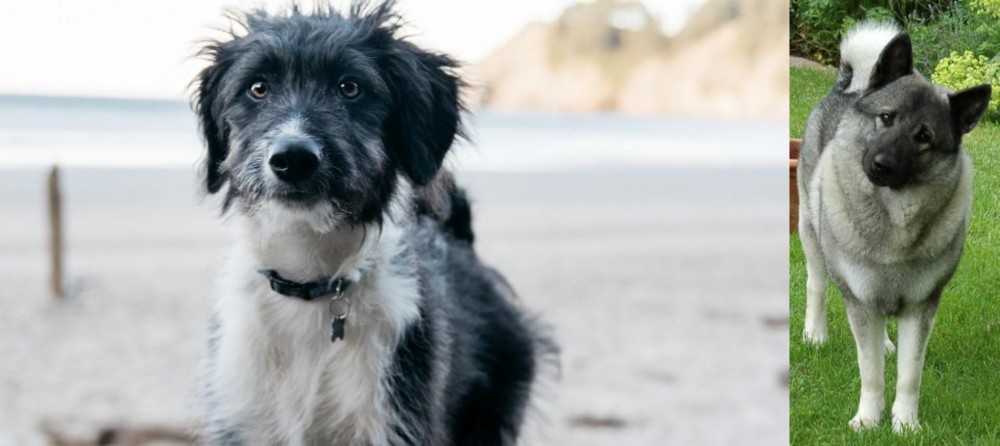 Bordoodle is originated from United States but Norwegian Elkhound is originated from Norway. Both Bordoodle and Norwegian Elkhound are of same height. Both Bordoodle and Norwegian Elkhound are having almost same weight. Both Bordoodle and Norwegian Elkhound has same life span. Bordoodle may have less litter size than Norwegian Elkhound. Bordoodle requires Low Maintenance. But Norwegian Elkhound requires Moderate Maintenance
Bordoodle is originated from United States but Norwegian Elkhound is originated from Norway. Both Bordoodle and Norwegian Elkhound are of same height. Both Bordoodle and Norwegian Elkhound are having almost same weight. Both Bordoodle and Norwegian Elkhound has same life span. Bordoodle may have less litter size than Norwegian Elkhound. Bordoodle requires Low Maintenance. But Norwegian Elkhound requires Moderate Maintenance
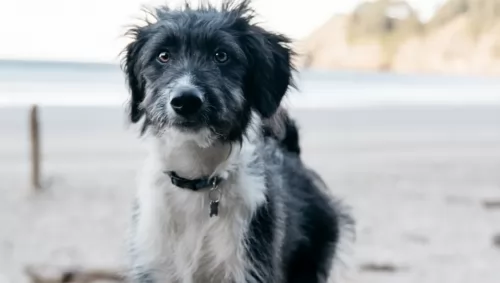 Known also as a Borderpoo or Borderdoodle, the Bordoodle is a designer- or hybrid breed which hails from the United States of America.
Known also as a Borderpoo or Borderdoodle, the Bordoodle is a designer- or hybrid breed which hails from the United States of America.
Both the dogs used in the development of this cross-breed are the Poodle and the Border Collie, and both these dog breeds have their own lengthy histories.
The history of the Bordoodle is short, as it is a modern crossbreed which has been purposefully bred by breeders to bring about a dog with certain looks and temperament.
 The Norwegian Elkhound is an ancient spitz-type dog breed hailing from Norway and with a history that goes back thousands of years.
The Norwegian Elkhound is an ancient spitz-type dog breed hailing from Norway and with a history that goes back thousands of years.
These dogs have been used as hunting dogs and have been able to bring down game such as Elk, bears, wolves, badgers and reindeer. They have also been used to guard livestock.
The Norwegian Elkhound was recognized by the American Kennel Club in 1913.
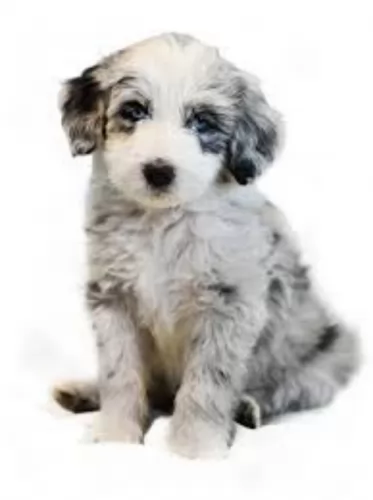 The Bordoodle isn’t a purebred dog but is a cross between a Poodle and a Border Collie.
The Bordoodle isn’t a purebred dog but is a cross between a Poodle and a Border Collie.
He has a soft, medium length coat which is inclined to be wavy. Colors are essentially black and white but chocolate, cream, fawn, merle and grey are also seen.
He is a medium sized dog standing at between 38cm and 55cm and weighing between 13kg and 27kg. The long tail is feathery, the ears floppy or semi-erect and the brown eyes are bright and intelligent. The muzzle is medium to long.
As with any mixed breed dog, the Bordoodle can take after either parent dog but generally the Borderdoodle will be a medium sized dog.
With the Bordoodle you can expect nothing less than a highly intelligent dog. That is because both the Poodle and the Border Collie are super intelligent dogs so the Bordoodle is guaranteed to have got a good portion of this intelligence from both breeds.
It makes training and socialization easy for the dog. It is important for your Bordoodle to be trained and socialized if you want him to be obedient and relaxed around strangers and other pets. As it is, his amicable nature makes the hybrid dog of yours a great family pet – getting on well with other pets in the home as well as with children.
Apart from being such a smart dog, the Bordoodle is active, playful, loving and devoted – everything a serious dog owner wants in a pet. This is a dog that doesn’t really know the meaning of the word aggressive.
 The Norwegian Elkhound is a medium to large sized dog standing at roughly 45 to 55cm in height and weighing anything fro 18 to 25 kilogams.
The Norwegian Elkhound is a medium to large sized dog standing at roughly 45 to 55cm in height and weighing anything fro 18 to 25 kilogams.
People love this dog because of his beautiful wolf-like face and bright eyes. The head is broad and wedge-shaped, the eyes dark brown, the ears stand erect and the bush tail curls over the dog's back.
The double coat has different shades of gray and silver with cream and white shades on the undercoat.
He is a moderate shedder with some seasonal shedding.
The Norwegian Elkhound is a high energy dog who loves to be busy and he also makes a loving and loyal companion towards his human family. He tends to be a little bit reserved around strangers.
He is an independent dog so so its a good idea to have him trained and socialized so that he is always obedient. He is an intelligent dog so you won’t battle to teach him.
He gets on well with children in the home. He however, can be a little bit aggressive with other dogs, but not if he was brought up with them as a puppy. Adventurous and active, he just loves spending time outdoors. It's why he is best suited to life in the countryside as opposed to the city and also prefers cooler climates.
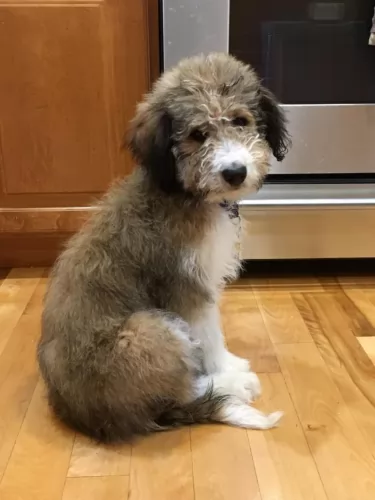 Bordoodles have two great dog breeds to thank for the way they turn out. When you think of the Border Collie and Poodle, you know you’re going to get a dog that is friendly, social, playful, loving and devoted – the ideal family pet.
Bordoodles have two great dog breeds to thank for the way they turn out. When you think of the Border Collie and Poodle, you know you’re going to get a dog that is friendly, social, playful, loving and devoted – the ideal family pet.
Intelligent, he is easy to train too, and with excellent care, you’re going to have a most wonderful family pet and companion, full of fun and life.
 Your Norwegian Elkhound makes an awesome pet. He is full of the joys of living and wants to be an active member of his human family.
Your Norwegian Elkhound makes an awesome pet. He is full of the joys of living and wants to be an active member of his human family.
He is active and always ready for some fun and games. He is also intelligent and will make an even better pet when he has been trained and socialized.
Those who have owned one of these beautiful dogs will always say how they adore this beautiful, smart, loving canine friend of theirs.
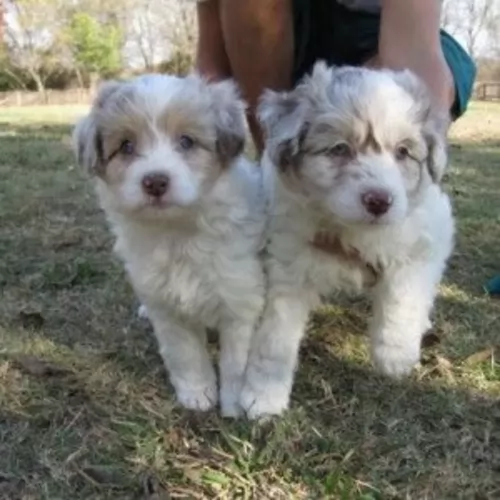 Bordoodles, when well cared for, can live to be 12-15 years of age. There aren’t going to be many health issues to contend with with your Bordoodle as there are no known health problems in this robust breed.
Bordoodles, when well cared for, can live to be 12-15 years of age. There aren’t going to be many health issues to contend with with your Bordoodle as there are no known health problems in this robust breed.
Nonetheless there are some common dog illnesses that you need to be aware of such as progressive retinal atrophy, hip dysplasia and hypothyroidism.
With hypothyroidism, the thyroid gland in the neck of your pet produces a hormone known as thyroxine that controls metabolism, but the disease hypothyroidism makes it that the gland doesn’t make enough thyroxine. Signs that your dog has this illness includes a dull coat, inflamed skin and even hair loss.
Get him to the vet immediately who will do blood tests and provide treatment. Mercifully it isn’t something that is life-threatening.
 Your beautiful Norwegian Elkhound can reach 15 years of age if you look after him well and he manages to avoid some of the common dog diseases there are.
Your beautiful Norwegian Elkhound can reach 15 years of age if you look after him well and he manages to avoid some of the common dog diseases there are.
There are some dog illnesses that are good to be aware of -
This is an eye condition where there is pressure that builds up in the eye. There is a problem with the drainage of fluid in the eye and this is what causes the pressure and there can be damage to the optic nerve.
This is a skin condition that causes inflammation and is often seen in dogs like the Norwegian Elkhound who have thick coats.
A common disease seen in many dog breeds, young and old, and which is a malfunction of the hip joints, causing problems with your dog’s mobility.
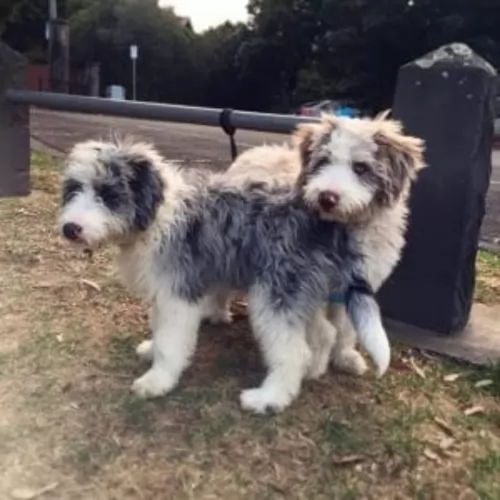 The Bordoodle is a dog which doesn’t shed that much so his grooming requirements are low and he is considered as a hypoallergenic dog.
The Bordoodle is a dog which doesn’t shed that much so his grooming requirements are low and he is considered as a hypoallergenic dog.
He will need to have his coat brushed at least twice a week to keep it shiny, soft and smooth. Depending on how your Bordoodle turns out, he may even require trimming at a professional groomer.
Make time to check his ears inside and out and learn how to clean the inside of his ears to avoid infection and wax build-up.
Dental hygiene is also imperative in dogs, and neglecting to do this will mean food particles and bacteria accumulating along your pet’s gumline, resulting in gingivitis and periodontal disease.
Every dog will require regular exercise and you can get your Bordoodle to join you in your walks. He is the kind of dog that can happily adjust to city or country life, but he will still need to have some ball games and other activities to keep him busy and happy.
He isn’t a dog that can be left alone day after day in the backyard. He is social and playful and loves the companionship of his human family.
If you feed your Bordoodle kibble from some of the top quality commercially produced foods, always research the dog food and take a good look at the ingredients.
The pet food you choose plays an important role in the longevity of your pet. There are commercially manufactured foods that have such poor ingredients that they can actually shorten your pet’s lifespan and cause stress to the kidneys and liver.
If in any doubt about what to feed your Bordoodle, speak to your vet. Cooked brown rice, cooked vegetables and cooked chicken can sometimes be mixed into your pet’s kibble. Raw meat should also occasionally be added in to ward off skin allergies.
 As a spitz type dog, the Norwegian Elkhound is an energetic dog who will need lots of physical activity.
As a spitz type dog, the Norwegian Elkhound is an energetic dog who will need lots of physical activity.
He has a very thick coat so make sure he doesn’t overheat during exercise as he has been used to living in wintry climates.
Your pet will shed some of that thick hair so he will need to be brushed at least twice a week to keep the coat in tip top condition. At the same time check him over for ticks and fleas. How often you see ticks on your dog will depend on where you live. These parasites attach to your dog and feed on his blood.They are capable of causing many diseases in your pet, one of which is Lyme disease, a disease which can lead to arthritis and swelling with your dog’s joints.
The best way to prevent any disease from weakening your pet is to get him to the vet as soon as possible. A good way to prevent ticks is to speak to your vet about tick control products.
Make sure he has the best food to ensure health and happiness. Keep his meals simple – no exotic, spicy foods that can upset his stomach.
A high quality kibble brand for energetic dogs is a wise choice and some tasty home-made food added in occasionally. This can be boiled chicken, brown rice and vegetables. Never leave him without a constant supply of fresh, cool water.